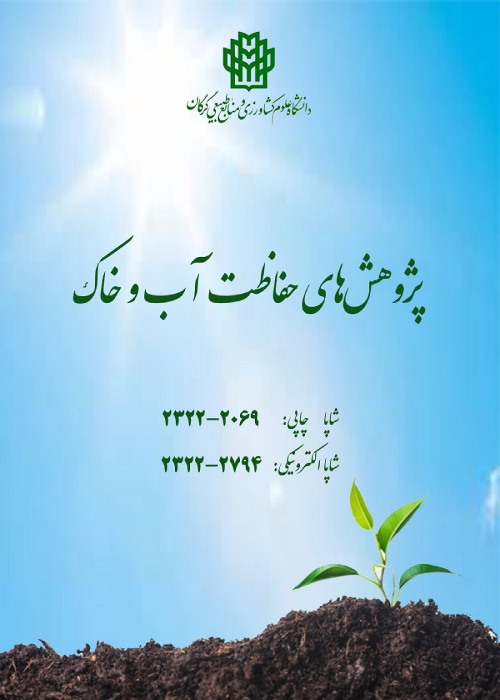The effects of gypsum and different organic waste on chemical properties and microbial respiration of a sodic soil
Author(s):
Abstract:
Background And Objectives
An ever-increasing growth in global population and in demand for water and nutrients has led to the use of less qualified water and soil for food production. Most countries have been utilizing uncommon, marginal sources like sodic and saline soils, which exist in abundance there. For usability of saline-sodic lands, their undesirable physicochemical properties must be amended. Gypsum and organic materials are utilized as amendments to sodic soils. Gypsum is used for reclamation of sodic soils owing to its conservation of electrolyte concentration at the surface and improvement of soil physical properties. Being gradually decomposed, organic materials cause an increase in gypsum solubility and ameliorate sodic soil physicchemical properties. For this reason, this work aimed at an evaluation of the impact of organic materials at different C:N ratios, both on their own and accompanied by gypsum, on chemical properties and microbial respiration of a sodic soil.Materials And Methods
A pot experiment including 27 treatments with three replications and a completely randomized block design was conducted in order to evaluate the impact of gypsum (0, 50 and 100℅ of gypsum requirement) both alone and accompanied by organic materials obtained from alfalfa plant residues, maize plant, date wastes and sawdust (1.5 and 3℅ organic carbon) on chemical properties and microbial respiration of a sodic soil. After the treatments were conducted, soil samples were incubated in the field capacity moisture at an appropriate temperature for two months; afterwards, soil sample was prepared from the experimental pots and soil chemical properties were measured before and after leaching. For leaching, water thickness was equivalent to the thickness of the leached layer of the soil. Furthermore, microbial respiration was measured immediately after the treatments were imposed.Results
According the results from this study, before leaching, treatment of gypsum at 100% gypsum requirement accompanied by 3℅ organic carbon from date source exerted a maximum effect, increasing the electrical conductivity and reducing the soil pH. Also, after leaching, a reduction occurred in the soil pH and electrical conductivity in all treatments. Maximum decrease in sodium absorption ratio (SAR) before leaching was obtained from the treatment of gypsum without organic materials, reducing the value of SAR from 29.12 in the control to 17.78. After leaching, the highest decrease in SAR was obtained with 3℅ organic carbon from date source accompanied by 100℅ gypsum requirement, the value of SAR decreased from 12.69 to 9.36. Maximum rate of microbial respiration (296.34 mg C) was obtained by consumption of 3℅ organic carbon taken from date wastes as the source without any application of gypsum. The lowest rate of microbial respiration arose from treatments without any application of organic carbon and sawdust.Conclusion
According to our results, coexistence of organic materials and gypsum has a maximum effect on the amendment of the sodic soil, on the condition that leaching is carried out after addition of gypsum and organic materials and two-month soil incubation. This way, salinity level and sodium exchange rate in soil can be considerably diminished. When leaching is not carried out after soil incubation, organic materials cause a rise in the undesirable properties of the soil, e.g. SAR. The higher C:N ratio in date wastes makes them have a higher decomposition rate and a more pleasant effect on the amendment of the sodic soil, as compared to alfalfa residues; simultaneous consumption of date wastes and gypsum intensified sodic soil amendment Keywords:
Language:
Persian
Published:
Water and Soil Conservation, Volume:23 Issue: 2, 2016
Pages:
23 to 41
magiran.com/p1571800
دانلود و مطالعه متن این مقاله با یکی از روشهای زیر امکان پذیر است:
اشتراک شخصی
با عضویت و پرداخت آنلاین حق اشتراک یکساله به مبلغ 1,390,000ريال میتوانید 70 عنوان مطلب دانلود کنید!
اشتراک سازمانی
به کتابخانه دانشگاه یا محل کار خود پیشنهاد کنید تا اشتراک سازمانی این پایگاه را برای دسترسی نامحدود همه کاربران به متن مطالب تهیه نمایند!
توجه!
- حق عضویت دریافتی صرف حمایت از نشریات عضو و نگهداری، تکمیل و توسعه مگیران میشود.
- پرداخت حق اشتراک و دانلود مقالات اجازه بازنشر آن در سایر رسانههای چاپی و دیجیتال را به کاربر نمیدهد.
In order to view content subscription is required
Personal subscription
Subscribe magiran.com for 70 € euros via PayPal and download 70 articles during a year.
Organization subscription
Please contact us to subscribe your university or library for unlimited access!


